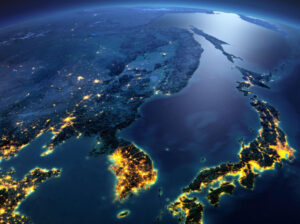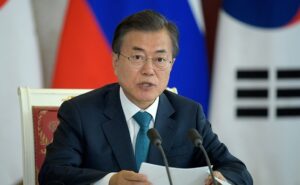by WorldTribune Staff, February 23, 2021
In last year’s disputed parliamentary elections in South Korea, leftist President Moon Jae-In’s Democratic Party of Korea won enough seats to give his party the legislative majority it needed to pass almost any law without the help of other parties.
In doing so, South Korean voters may have paved the way for a “quasi-communist” takeover of the nation, Inho Lee, professor emeritus at Seoul National University and former South Korean ambassador to Finland and Russia, noted in a Feb. 14 analysis in Small Wars Journal.

Moon’s party, dominating the National Assembly by a three fifth majority, rammed through a whole bundle of new laws in the face of frontal resistance from not only the inept opposition party but the concerned public at large.
One new law stipulates that anyone making any remark considered derogatory to the honor of the participants of the Kwangju uprising of 1980 is liable to a fine of up to ₩50 million (roughly $50,000) or up to 5 years of imprisonment. A wide-spread understanding of the Kwangju uprising, now officially enshrined as the “518 Democracy Movement,” is that North Korea’s underground instigation and intervention exacerbated what had started out to be a pro-Kim Dae-Jung student demonstration during the power vacuum created after the assassination of President Park Chung-Hee.
The second notable enactment concerns the launching of an investigative agency under the direct control of the President. Called “Gongsoocheo,” or the Corruption Investigation Office for High-ranking Officials (CIO), it will have an exclusive and irrevocable right to investigate and prosecute any charges brought against any government official above a certain rank. Judges and military generals will be no exception.
A third law deprives the National Intelligence Service (NIS) the right to conduct any search concerning pro-communist activities while still another criminalizes sending of information balloons and other items to North Korea. It is this last piece of legislation which triggered the attempt by the U.S. Congress to look into the violations of the human rights situation in South Korea, but that is touching only a tip of the iceberg.
Four years ago, it was quite understandable why people, whether Koreans or foreign observers, staked high hopes and great expectations on the government born of the “candlelight revolution.” After all, there was something poetic about powerless common people overthrowing the powerful by just demonstrating “peacefully.” Korea’s democracy could be celebrated as “strong” and “vibrant.”
When that democracy has soured into a one-party dictatorship bordering upon totalitarianism and lamentation over the imminent death of the liberal democratic republic is increasingly audible, ignoring the patently obvious evidence is inexcusable and fatal to the continued survival of human society.
What happened, and how did it and how could it happen?
In retrospect, one may ask if South Korea in 2016 or 2017 was a country sick enough to require a “revolutionary” makeover. No, it was not. It was no Russia of 1917. Not even the Philippines of Marcos.
Koreans were proud of and envied for their successes in both political democratization and economic development with their social and cultural effects. The long-time opposition party could win the presidential power through orderly elections and institute radical reforms, bringing former presidents of the Republic to justice and opening the door to North Korea.

There was not even a shred of hard evidence that the incumbent President Park Geun-Hye, in spite of all her lack of political skills and acumen, committed any crime detrimental to the interest of her country, let alone deserving of impeachment.
A “revolution,” and presidential impeachment under such circumstances was bound to be a breach of social contract than its more faithful implementation, a reaction rather than a step forward. It was in fact an act of treason disguised as a popular call for a revolutionary “cleansing of all accumulated evils” and a drastic reduction in the “imperial” power of the president.
The result obtained three years later is the exact opposite of what was promised, quasi-imperial power of the presidency and totalitarian control over individual life of the citizens.
Admittedly, all these “revolutionary” changes were brought about by following the letters of the country’s law and obtaining popular consent through voting in the National Assembly. To say therefore that the result is justified, however, is tantamount to saying that everything Hitler did can be justified, because it was done with the consent and participation of the German people.
We have to admit the inconvenient and painful fact that South Korea, in spite of its great economic superiority over North Korea, lost the war of propaganda and agitation to the North so that the people have voted into power persons, starting with president Moon, who believe that bringing two Koreas together under the aegis of the nuclear-powered North Korea serves the best interest of the Korean people and would stop at nothing to achieve their goal.
They have already succeeded in building a quasi-totalitarian political control system capable of suppressing voices other than their own, not only in Korea but in the world outside as well because they do not spare resources for propaganda and agitation. Their surprising success in hiring former House Foreign Affairs Committee Chairman Ed Royce, a longtime advocate of human rights in North Korea, as their lobbyist is a case in point.
South Korea’s voters themselves, no one else, brought about this unheard of phenomenon of a prosperous democratic polity suddenly degenerating into a totalitarian society. But the responsibility of those who should have known better than ordinary people, the opinion leaders and experts, who have the power to influence public reaction cannot be taken lightly. They should have known that any claim to a monopoly of moral rectitude on the part of a power group is none other than their claim to monopolize the right to perpetrate evil.
Related: Eerie parallels between U.S., South Korean elections foreshadowed in September 2020 webinar, February 15, 2021
In this sense, the tragic case of Korea’s sudden degeneration into a populist totalitarian society and likely fall into a historically familiar pattern of subservience and subordination to the imperialistic Chinese hegemony has to be noted with a pang of conscience by all would-be intellectuals/dreamers.
In spite of these highly disconcerting developments in Korea in recent years, the friendship between ordinary Koreans and Americans and the ideal on which the U.S.-ROK alliance is based remain unchanged.
America and the rest of the free world must realize, however, that the current Korean government is no spiritual heir to predecessors with their commitment to freedom and democracy. Korean citizens, belatedly waking up to the disguised threat to their freedom and security posed by their own government, need to be assured that the United States and others in the free world see the Moon regime for what it is, if these besieged people are to have the courage to break out of their torpor and forestall a total collapse of freedom and a likely fall into the traps set by North Korea and China.
If a free and prosperous country in this pivotal corner of the global community is allowed to turn quasi-communist and totalitarian, the danger faced by the rest of the world could not but be redoubled.
Intelligence Brief __________ Replace The Media
